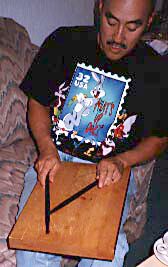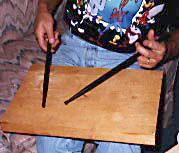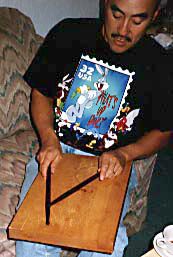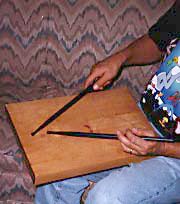 I caught up with him in Baltimore, when he'd arrived to participate on a review panel for the Mid Atlantic Arts
Foundation. We had a long, wide-ranging discussion, some of which appears below.
I caught up with him in Baltimore, when he'd arrived to participate on a review panel for the Mid Atlantic Arts
Foundation. We had a long, wide-ranging discussion, some of which appears below.
This jazz drummer, who's Japanese American, has had a long career. He's played and recorded with
people like Art Farmer, the Heath Brothers, Jim Hall, James Moody, Lena Horne, and Ruth Brown. His best-known
recordings may be the series released under the artistic name, TanaReid. The name comes from a collaboration
with bassist, Rufus Reid, as co-leaders of a changing ensemble.
 I caught up with him in Baltimore, when he'd arrived to participate on a review panel for the Mid Atlantic Arts
Foundation. We had a long, wide-ranging discussion, some of which appears below.
I caught up with him in Baltimore, when he'd arrived to participate on a review panel for the Mid Atlantic Arts
Foundation. We had a long, wide-ranging discussion, some of which appears below.
- On Asian American music and jazz -
The term, "Asian American", is one that Tana is no stranger to. In the mid or late 80's, he coproduced
with Cobi Narita several Asian American jazz festivals in New York.
Later, he formed a group called the Asian American Jazz Trio that put out a CD or two on the Evidence
label. The story behind it was that in 1990 or 91, he had been invited to perform in the San Francisco
Asian American Jazz Festival. He asked Rufus Reid and pianist Kei Akagi to join him for the gig.
Not long afterwards, he had an opportunity to record the trio for King Records, a Japanese label he'd known for many years.
He decided to name the group, the "Asian American Jazz Trio." The recording was licensed by Evidence
Records and released stateside. The trio has performed a few times since.
Given that background, I wondered what thoughts he might have on applying the term "Asian American" to music or jazz.
Tana: -- I've... had some interesting discussions with some people in the Asian-American music group...
What is it? What does it represent? Because when you hear the music, you pretty much see the same group,
or the same people that are always presented and are always presented under this umbrella, under this
name of "Asian-American jazz."
Q: So the question could be phrased, "Is it the people, or is it the music?"
Tana: Yeah, that's true. That is the question. Is it the people or is it the music? For example,
there are a couple of musicians who are Asian or Asian-American, but they haven't really taken the
initiative to become part of this scene, and I wonder why. Is it because they play a different kind
of music that will not really let them become identified with the kind of music that is being presented
by these kinds of groups? So it's an interesting question.
For example, Kei Akagi isn't really a part of that scene. And I'm not involved so much, maybe
because we're geographically separated from the scene, but maybe it's because the music that we play and
the projects we're involved in, isn't really part of that scene. And it's interesting -- I don't know
how to find the right word to express it... it's true for anything.
[Say] you're involved in the community, the Asian community, the Asian-American community. Do you
stay within that realm and become part of it, or do you venture out of it, and try to explore different
possibilities with different, other kinds of groups or other kinds of people that may not have any
connection with that core group, ethnically speaking? Or culturally speaking?
- On knowing musical legacy -
 Tana: ...I hope that the younger Asian-American artists and musicians, whether they're
into hip-hop or rapping or whatever they're doing -- they can't help but be part of it,
because it's really part of their stuff... But they should also be aware of what came
in terms of the generation before them, in terms of the kinds of things Hiroshima has
done, or even John Jang, or Mark Izu, or Kei [Akagi], or [Toshiko] Akiyoshi...
Tana: ...I hope that the younger Asian-American artists and musicians, whether they're
into hip-hop or rapping or whatever they're doing -- they can't help but be part of it,
because it's really part of their stuff... But they should also be aware of what came
in terms of the generation before them, in terms of the kinds of things Hiroshima has
done, or even John Jang, or Mark Izu, or Kei [Akagi], or [Toshiko] Akiyoshi...
Q: It's interesting because a couple of years back, there was this tour of some rock bands
-- I guess you call them alternative rock bands -- Seam is one. It's led by a Korean-American
guy out of Chicago. Another group is Versus. They're Filipino-American, mostly. They're out
of New York.
I asked them, "What do you listen to? Have you heard of Hiroshima?" And one of
them said, "I think that's a jazz band."
Tana: But that's how they're marketed. Hiroshima's marketed [as a jazz band] because they
can't find another place for them. It's like smooth jazz, but it's like R&B. Basically, it's
like soul music. They were doing tours, opening for R&B groups.
Q: The point I'm trying to make is, though, that one [of the alt rockers] was sort of familiar,
and one was barely familiar... maybe [he had only] just heard [of] the name before... obviously, the
music's not quite in the same style. It's not alternative rock.
In fact, they both mentioned some other drummer I'd never heard of -- some Chinese-American guy
who'd come out of Detroit a couple of years before who'd been an inspiration to them.
Tana: But that's stuff you'd never heard of, right? I haven't heard of it either. Just because
we haven't heard of it doesn't necessarily mean that it's not good or it's not happening the same
way that... But because we're older, we're trying to impress on the younger kids that they should
be a little bit more [aware] of history.
When I came up... Tony Williams and Jack DeJohnette, that was all I listened to, all I loved.
And then I moved up to New York and studied the music a little more, and then I realized I had the
chance to play with the Heath Brothers -- I played with Percy Heath, who'd played with Kenny Clark,
with Charlie Parker. All of a sudden you start to realize there's a whole continuum in history,
stuff that came before you... That if you really want to be a part of this and have an understanding,
a deeper understanding of what this music's all about, you can't just be focused on this one area.
You may not like it, you may not play that style, but at least to be aware of, well, Tony Williams,
[and] what came before Tony Williams: Jimmy Cobb, Philly Joe Jones, and before that, Max Roach. And
somewhere in there, Art Blakey's in there, and then there's Kenny Clark and the Big Sid Catlett,
and Baby Dodds, in terms of drummers... Papa Jo Jones... You may not particularly know, note for note,
the style and sound that they had, but at least to know there's a lineage on this particular instrument
and to be able to at least drop a name here and there -- like I'm doing... I mean, I can't sing for
you a Baby Dodds solo. I've never transcribed anything, [though] I've heard it...
 In the same way, people should talk about Toshiko Akiyoshi, and what she's done. For
example, when she writes, she does so many different [things]... She's written for traditional Asian
instruments, pieces she recently did last year in San Francisco with Miya Masaoka, the koto player,
...Akiyoshi was commissioned to write something for her. But she's done so many things, it's not just
this one way of playing. I've done gigs with her in a trio or quintet setting. Her thing is like Bud
Powell, when she plays. She's got a lot of different bases covered, and I think it's important.
In the same way, people should talk about Toshiko Akiyoshi, and what she's done. For
example, when she writes, she does so many different [things]... She's written for traditional Asian
instruments, pieces she recently did last year in San Francisco with Miya Masaoka, the koto player,
...Akiyoshi was commissioned to write something for her. But she's done so many things, it's not just
this one way of playing. I've done gigs with her in a trio or quintet setting. Her thing is like Bud
Powell, when she plays. She's got a lot of different bases covered, and I think it's important.
For any artist, you may specialize in a certain area, but you can really tell a difference
in someone, the depth of their understanding and conceptually, when they know about other stuff. When
you hear about groups like Spiro Gyra and Jay Beckstein playing, [their] style of fusion music...
It doesn't have a depth for me as when you hear Weather Report or you hear Joe Zawinul play that stuff -- because
Joe Zawinul had played with Dinah Washington, Cannonball Adderly... Cannonball Adderly for ten years!
And he's an immigrant. He's from Austria. And he played with Dinah Washington! And he evolved
conceptually, and [that] comes out when he and Wayne Shorter do Weather Report, so their stuff really has a lot of
depth. Guys that are younger hear Weather Report and they just emulate that, but they don't understand
what came before. They do, I'm sure, but it doesn't somehow come out as deep, conceptually. There's
a certain grounding from learning about what historical things give your expressions more depth. It's
true, it's not just limited to music -- I think it's true...
It's like [what] you hear about golfers. Really studying the game and knowing. Tiger Woods knows
so much about the history of the game and players... I don't know who these people are, but he knows about
this and that... And he's a student of the game, the same way that everyone in the arts
should also be a student of their area of specialty.
I'm Japanese American. I was kind of interested in Japanese jazz. I went to Japan for
the first time in the 70s and I heard Japanese musicians play live in this club. I couldn't believe it,
these guys played so good. But they also sounded like they were just copying certain styles. Where is
true "Japanese expression" in jazz music? Is it possible? Is there one?
- On gaining recognition -
Q: It's a common thing for musicians to complain about the music industry and I'm wondering -- do you think you have things figured out in terms of the industry? ...how to do things, or produce things, who to work with, dealing with publishers, record companies...?
 Tana: It's a learning experience every time you try to do something. But I don't think you'll ever
be able to figure everything out. Otherwise we'd all be millionaires. Not to say that if you're a
millionaire you've figured it all out! But it's really difficult because you're dealing with an industry
that -- just like in other kinds of industries, especially nowadays -- it's about numbers, it's about
selling, it's about product, it's about marketing...
Tana: It's a learning experience every time you try to do something. But I don't think you'll ever
be able to figure everything out. Otherwise we'd all be millionaires. Not to say that if you're a
millionaire you've figured it all out! But it's really difficult because you're dealing with an industry
that -- just like in other kinds of industries, especially nowadays -- it's about numbers, it's about
selling, it's about product, it's about marketing...
And it's about youth. And it's about being really old.
Let's take for example Joe Henderson. He's won Grammies, recently, and he's put
out some recordings. But to me they don't measure up to the records he made in the 70s, 60s, on Blue
Note. And that was some serious music. But he's lasted and he's getting recognition. Unfortunately
he's very ill now, I hear, but he's making some really good money, which he deserves, and he's Joe Henderson.
Jimmy Heath -- he's a saxophonist who's always been in the background. He's talked about with Sammy Rollins,
he's talked about with John Coltrane... But Jimmy's always been there, and now he's 72 years old. And now
he's getting all this recognition...
Ruth Brown, always jokes on stage, "I'm working a lot now because there's nobody else left. Everyone else is either sick or
dying off and there's no one else of my generation, so they're calling me now. And I'm getting nominated
for this and that, and getting all this recognition. It's our time."
It's unfortunate that you have to wait so long and struggle such a long time to get that kind of recognition.
Then on the other hand, there are all these young guys who have no experience, but the record companies see these marketable
objects and their music is okay, but they don't have the experience.
For example, someone like Kenny Barron. He's in his late 50s now... but he's always been there, over the years.
Now it's his time, and he's got his Verve recording contract, commanding fees that are cognizant of his abilities
and his experience. So it's almost like he paid his dues, and... He paid his dues and hopefully one day...
You keep investing, and you wait for this payoff someday, but you don't do it for that purpose.
You do it because you love the music and you have this creative spirit, and you keep plugging away...
But it's difficult. It's a difficult thing...
It's important to evolve and to learn about different ways of being creative, not just be one
way all the time.
__________________________________________________________________________________
Beat out your comments and questions to aa_music@myrealbox.com
or...
Return to: